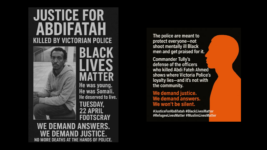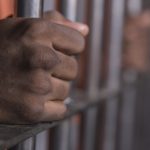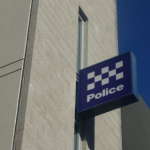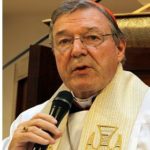The Victoria Police Killing of Homeless Somali Man: Justified or Excessive Force?

Two Victoria police officers shot dead Somali man Abdifatah Ahmed at around 9 pm on Thursday 17 April 2025, after being called out to the corner of Paisly and Albert streets in the Naarm-Melbourne suburb of Footscray, due to a report of a man holding a knife, and questions are now being asked as to why law enforcement took the lethal option to subdue a man suffering a mental health episode.
In various statements, Victoria police has explained that the officers involved were confronted with “an extremely volatile and high-risk situation”, which involved them calling on Ahmed to drop his knife, but “the man then charged the police, still armed with the knife”, and the pair of officers then “made a tactical decision to use their firearms in a small matter of moments”.
Ahmed, a Muslim man, came to Australia from Somalia with his family many years ago as a refugee, and he used to live with them interstate. But of late, Ahmed had been sleeping rough on Wurundjeri and Bunurong land in the inner-city Melbourne suburb, where he was well known to locals, many of whom have since underscored to the press that he was well liked amongst the community.
But many locals in Footscray, especially people of African descent, are questioning the validity of what has happened, as a Black man holding a knife was gunned down almost instantly, by white police officers specifically trained in de-escalation techniques and in responding to such situations via means other than lethal force, which includes the use of tasers.
And while Victoria police strongly rejects “any claims that this matter was racially motivated”, the throngs of protesters who converged on the streets of Footscray last Tuesday, with banners stating Black Lives Matter, Refugee Lives Matter and Muslim Lives Matter, aren’t so convinced, and they’re now calling for an independent investigation, as the police inquiry is not likely to buck any trends.
Investigating their own
Community members and protesters alike have questioned the official police version of events. Footage capturing the scene only covers the moments directly after the shooting, with one of the officers who shot Ahmed seen to be stepping backwards away from the victim then lying unmoving on the ground. And witnesses have suggested both officers fired multiple times at close range.
“They murdered him,” Somali community advocate Ibrahim Abdulahi Ali told the Herald Sun last weekend. “He had a knife and then they approached him with guns.”
Ali also set out the reasons as to why many in the community are not convinced with the Victoria police version of events, and why they’re not prepared to “accept this as just another tragic incident”, in a 20 April Facebook post.
According to Ali, the claim that Ahmed charged at the officers is disputed, as there is no eyewitness verification of this, and neither is there any body-worn camera footage showing this to be the case, while the police reliance on lethal force is queried despite the presence of the knife, as “many white Australians have survived encounters with police while armed”.
Ali questions why the attending officers didn’t use tasers as a nonlethal option to deal with the situation. However, Victoria police said on Tuesday that the attending officers weren’t equipped with these devices, as while an initiative to provide all frontline police officers with tasers was launched in 2021, it has so far only resulted in 60 percent of officers in possession of the device.
The Somali community spokesperson also questions the adequacy in having homicide detectives investigating the police killing “with oversight from Professional Standards Command, as is standard procedure for a fatal police shooting”, because he considers police investigating police will lack the “fairness and transparency” that an independent inquiry would bring.
“This is not just about one man,” Ali continued in his post. “This is about a pattern. A system. A long history of Black lives being ended by state violence – and the same recycled statements following each one. We are tired of press releases written to defend officers before the facts are even known.”
A history of prejudice
Charges of prejudicial behaviour against Black people by Australian police forces were present from their inception, as each force was established whilst the violent dispossession of the First Peoples of this continent was being progressed by the governing bodies of the day, while policing cultures and policing outcomes to this day are understood to be influenced by systemic racism.
As for police shootings, in the latter decades of last century Victoria police did have something of a reputation for being trigger happy during incidents with civilians.
However, the African community in the Greater Melbourne region underwent something of a demonisation and criminalisation process that commenced mid-last decade, and involved a number of crimes committed by teens of African descent being spun into the so-called “African gang” crimewave, and used as political capital, especially by then Turnbull government ministers.
The African gang moral panic in Victoria commenced after a brawl broke out between two sets of African youths at the 2016 Moomba festival in Naarm. The blame for this was placed on the Apex gang, although the reality of this gang even existing was under dispute. And while the fear was over “African gang violence”, Sudanese youths were singled out for particular attention.
Federal Liberal leader Peter Dutton was quoted as saying at the time, in response to the so-called African gang crisis sweeping Melbourne, that “the reality is people are scared to go out to restaurants of a nighttime because they’re followed home by these gangs, home invasion and cars are stolen”.
Dutton, the potential next PM, has played the race card to his advantage over his entire political career. The Liberal leader’s racism has also targeted First Peoples, Lebanese people, people from Pacific island nations and refugees in general. But in terms of white South Africans, in 2018, Dutton singled them out as the right type of refugees for Australia.
Periodically, particular nonwhite youth groups are called out for special criminalisation in Australia to produce a politically advantageous moral panic amongst the constituency. This is happening to First Nations youths right now, although this is hardly their first time in the spotlight, while youths of Middle Eastern descent have been demonised in the past, as have young Asian people prior to that.
And such racialised youth crime waves are unsurprisingly not often supported by official statistics.
Police should not be first responders
The Justice for Abdifatah rally involved hundreds of civilians converging on Footscray last Tuesday, and tempers between police and protesters were said to have flared. Amongst the placards displaying the phrase “Black Lives Matter” were others that stated, “Mental health needs care not bullets”, which is indicative of a broader issue going on right across this nation in regard to police.
The idea that law enforcement officers being used as first responders in order to deal with mental health crises in the community has long been questioned. But of late, this has been gaining further traction in various jurisdictions, especially NSW, as it would appear that the public isn’t so happy with the current system that essentially sees police officers shooting people having an episode.
Four deadly police shootings and an incident involving the lethal use of a taser on a 95-year-old woman using a walking frame who suffered dementia occurred in NSW between May 2023 and January last year, and all these deaths involved a civilian likely having a mental health episode.
This led to a NSW parliamentary inquiry which recommended that the state considers implementing a version of the UK’s new Right Care, Right Person initiative, as it determines whether to dispatch police or mental health professionals to particular incidents, and this system even provides a second emergency number that can only result in trained mental health workers being dispatched.
As for the supporters of Abdifatah Ahmed, Ali set out in his 20 April Facebook post that they’re demanding the “immediate public release of body-worn camera footage, a truly independent investigation, transparent communication with the family and the community” and “accountability for those who pulled the trigger and those defending it”, because “Abdifatah Ahmed’s life mattered”.







